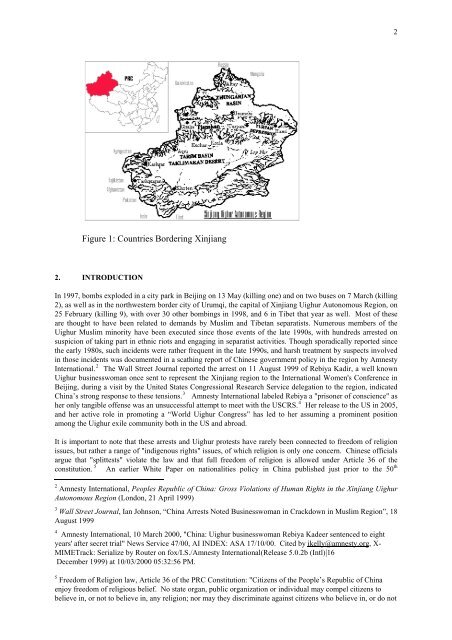Dru C. Gladney, Ph.D. - House Foreign Affairs Committee Democrats
Dru C. Gladney, Ph.D. - House Foreign Affairs Committee Democrats
Dru C. Gladney, Ph.D. - House Foreign Affairs Committee Democrats
Create successful ePaper yourself
Turn your PDF publications into a flip-book with our unique Google optimized e-Paper software.
2<br />
Figure 1: Countries Bordering Xinjiang<br />
2. INTRODUCTION<br />
In 1997, bombs exploded in a city park in Beijing on 13 May (killing one) and on two buses on 7 March (killing<br />
2), as well as in the northwestern border city of Urumqi, the capital of Xinjiang Uighur Autonomous Region, on<br />
25 February (killing 9), with over 30 other bombings in 1998, and 6 in Tibet that year as well. Most of these<br />
are thought to have been related to demands by Muslim and Tibetan separatists. Numerous members of the<br />
Uighur Muslim minority have been executed since those events of the late 1990s, with hundreds arrested on<br />
suspicion of taking part in ethnic riots and engaging in separatist activities. Though sporadically reported since<br />
the early 1980s, such incidents were rather frequent in the late 1990s, and harsh treatment by suspects involved<br />
in those incidents was documented in a scathing report of Chinese government policy in the region by Amnesty<br />
International. 2 The Wall Street Journal reported the arrest on 11 August 1999 of Rebiya Kadir, a well known<br />
Uighur businesswoman once sent to represent the Xinjiang region to the International Women's Conference in<br />
Beijing, during a visit by the United States Congressional Research Service delegation to the region, indicated<br />
China’s strong response to these tensions. 3 Amnesty International labeled Rebiya a "prisoner of conscience" as<br />
her only tangible offense was an unsuccessful attempt to meet with the USCRS. 4 Her release to the US in 2005,<br />
and her active role in promoting a “World Uighur Congress” has led to her assuming a prominent position<br />
among the Uighur exile community both in the US and abroad.<br />
It is important to note that these arrests and Uighur protests have rarely been connected to freedom of religion<br />
issues, but rather a range of "indigenous rights" issues, of which religion is only one concern. Chinese officials<br />
argue that "splittests" violate the law and that full freedom of religion is allowed under Article 36 of the<br />
constitution. 5 An earlier White Paper on nationalities policy in China published just prior to the 50 th<br />
2 Amnesty International, Peoples Republic of China: Gross Violations of Human Rights in the Xinjiang Uighur<br />
Autonomous Region (London, 21 April 1999)<br />
3 Wall Street Journal, Ian Johnson, “China Arrests Noted Businesswoman in Crackdown in Muslim Region”, 18<br />
August 1999<br />
4 Amnesty International, 10 March 2000, "China: Uighur businesswoman Rebiya Kadeer sentenced to eight<br />
years' after secret trial" News Service 47/00, AI INDEX: ASA 17/10/00. Cited by ikelly@amnesty.org, X-<br />
MIMETrack: Serialize by Router on fox/I.S./Amnesty International(Release 5.0.2b (Intl)|16<br />
December 1999) at 10/03/2000 05:32:56 PM.<br />
5 Freedom of Religion law, Article 36 of the PRC Constitution: "Citizens of the People’s Republic of China<br />
enjoy freedom of religious belief. No state organ, public organization or individual may compel citizens to<br />
believe in, or not to believe in, any religion; nor may they discriminate against citizens who believe in, or do not











![Transcript [PDF] - House Foreign Affairs Committee Democrats](https://img.yumpu.com/34524080/1/190x245/transcript-pdf-house-foreign-affairs-committee-democrats.jpg?quality=85)



